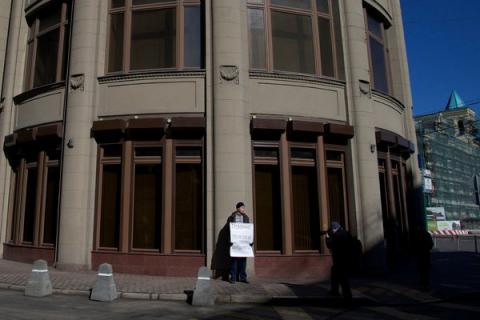MOSCOW — In the far east, the teachers went on strike. In central Russia, it was the employees of a metallurgical plant. In St. Petersburg, autoworkers laid down their tools. And at a remote construction site in Siberia, laborers painted their complaints in gigantic white letters on the roofs of their dormitories.
“Dear Putin, V.V.,” the message said. “Four months without pay.”
After months of frustration with an economy sagging under the weight of international sanctions and falling energy prices, workers across Russia are starting to protest unpaid wages and go on strike, in the first nationwide backlash against President Vladimir V. Putin’s economic policies.
The protests have been wildcat actions for the most part, as organized labor never emerged as a strong political or economic force in modern Russia. Under the Soviets, labor unions had been essentially incorporated into management.
Russian companies tend to avoid laying off workers in a downturn to limit severance payments — or to evade the wrath of officials trying to minimize unemployment in their districts. So with the Russian economy expected to contract this year and next, many workers are going unpaid or being sent away from their factories for a few days at a time of unwanted “vacations.”
Unpaid wages, or wage arrears, an old scourge in Russia, rose on April 1 to 2.9 billion rubles, or about $56 million, according to the Russian statistical service. That is a 15 percent increase over a year earlier, but experts say that still does not capture the scope of the diminished pay of workers involuntarily idled during the slowdown.
Discontent over unpaid wages was tamped down for a while by a surge in national pride after the annexation of Crimea from Ukraine a year ago, and by repeated messages on state television that the hardship was an unavoidable price to pay for standing up for Russia’s interests. The strikes, in any case, have not been widely publicized in the state news media.
Yet the strikes and protests in the hinterlands, like the huge graffiti addressed to the president, are posing a new challenge to Mr. Putin’s government, which presided over an energy-driven economic expansion for most of the past 15 years.
During that time, most high-profile antigovernment protests, including the so-called White Ribbon movement in Moscow in 2011, promulgated political causes rather than economic ones. Those were met with corresponding political measures by the Kremlin, such as arrests and stricter laws on staging rallies. A further chill fell over the liberal political opposition this winter after the assassination of a prominent leader, Boris Y. Nemtsov.
But the labor actions are putting forward financial demands, and are being staged in Russian rust belt towns where the government is unlikely to find easy economic solutions to resolve the grievances so long as the recession lasts and oil prices remain low.
Regional newspapers described the teachers’ strike this month — in Zabaikal Province, bordering China — as the first such labor action by teachers in Russia in years. The strike went ahead even though a regional governor had implored the teachers to work unpaid for patriotic reasons, which suggested some waning of the nationalistic pride over the Crimean annexation.
“Yes, it is serious when salaries are not paid, but not serious enough not to come to work,” the governor, Konstantin Ilkovsky, had insisted. Mr. Ilkovksy said the federal government had delayed transferring tax revenue to the region, causing the delay in payments.
In the Ural Mountains, workers at the Kachkanarsk metallurgical plant that enriches vanadium, a metal used in steel alloys, went on a work-to-rule strike in March over layoffs.
In the nearby city of Chelyabinsk, managers at the Chelyabinsk Tractor Factory, which has a rich and storied history as a showcase of industry in the Communist era, sent workers home on mandatory vacations for one day a week, presumably to spend in their apartments in the wintertime.
And not far from the Estonian border, automobile workers at a Ford assembly plant went on strike to protest cutbacks brought on by the dismal automotive market in Russia.
The actions are in line with economists’ predictions that the recession caused by the Ukraine crisis and falling oil prices will bite Russia hardest in rural areas and single-industry towns.
for the rest of this article, please go to http://www.nytimes.com/2015/04/22/world/europe/russian-workers-take-aim-at-putin-as-economy-exacts-its-toll.html?emc=edit_th_20150422&nl=todaysheadlines&nlid=19734775


Spread the word